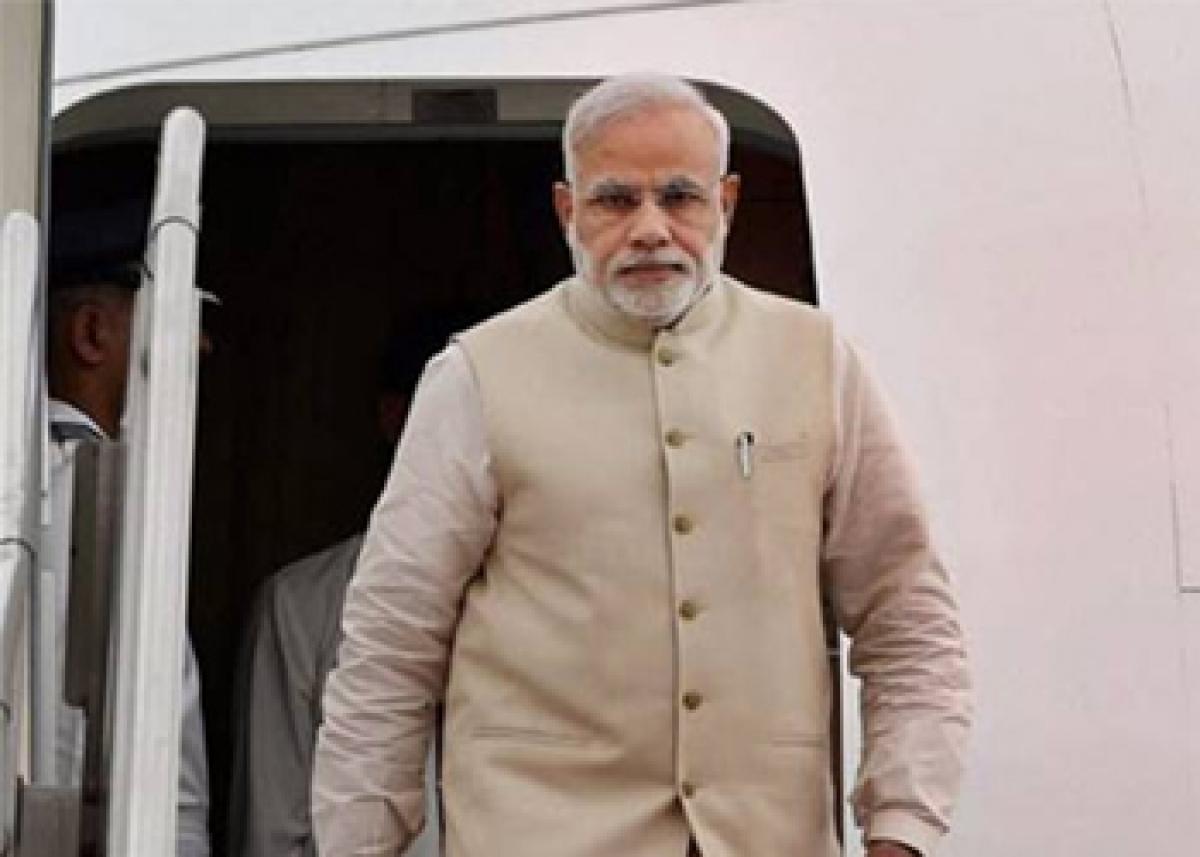Live
- GMR Airports Unveils AI-Powered Digital Twin Platform to Transform Airport Operations
- India poised to become leading maritime player: PM Modi
- Top Causes of Kidney Stones and How to Recognize Silent Symptoms
- India’s renewable energy capacity logs 14.2 pc growth at 213.7 GW
- Winter Session of Odisha Assembly adjourned sine die
- Biden calls Trump's tariff approach 'major mistake'
- After Drama Over Eknath Shinde’s Chief Minister Race, Maharashtra Cabinet Formation Faces New Tensions
- Egyptian FM, Blinken discuss recent developments in Syria
- Iran's supreme leader says Syria's developments result of US-Israeli 'plot'
- Elon Musk to Purchase $100 Million Luxury Mansion Next to Donald Trump's Mar-a-Lago, Report Reveals
Just In

The Prime Minister Shri Narendra Modi\'s recent visits to France, Russia and Japan were aimed to bring in socio-economic and scientific development particularly in the field of atomic energy. The details are as under:
The Prime Minister Shri Narendra Modi's recent visits to France, Russia and Japan were aimed to bring in socio-economic and scientific development particularly in the field of atomic energy. The details are as under:
France : During the visit of Prime Minister to France in April 2015, Nuclear Power Corporation of India Limited (NPCIL) and the French nuclear power company AREVA NP signed a Pre-Engineering Agreement (PEA) for Jaitapur Nuclear Power Project (JNPP-1&2) based on the Evolutionary Pressurised Reactor (EPR) technology. The PEA will facilitate NPCIL to obtain details of the EPR technology, make a detailed safety assessment of the plant and take up licensing process with Atomic Energy Regulatory Board (AERB). During the same visit, a Memorandum of Understanding was also signed between the Indian company M/s L&T and M/s AREVA of France on 10.04.2015 for cooperation to maximize localization for the French -designed nuclear reactors in India in accord with Government's 'Make-in-India' initiative.
Russia : A Programme of Action for Localisation of Manufacturing in India for Russian-designed Nuclear Power Plants was signed between India and Russia on 24.12.2015 during the visit of Prime Minister of India to Moscow. The programme covers localisation in India for major equipment and spares as well as fuel assemblies for future Russian-designed reactors in India, in accord with Government's 'Make-in-India' initiative. Coinciding with the visit of Hon'ble Prime Minister to Moscow, an Integrity Pact for the project for Kudankulam Units - 5&6 was signed between NPCIL and the Russian reactor supplier Atomstroyexport.
Japan : Recent high-level engagements with Japan, including the visit of Prime Minister to Japan in August 2014 and the visit of Japanese Prime Minister to India in December 2015, have led to the negotiation on bilateral civil nuclear cooperation agreement being concluded in December 2015, bringing to a close five years of negotiations on this issue. The agreement will enable India to take advantage of Japan's advancements in the civil nuclear domain, and will make a direct contribution to India's civil nuclear programme.
India has signed Inter-Governmental Agreements with a number of international partners for cooperation in peaceful uses of nuclear energy. The scope of cooperation inter alia covers the supply of nuclear material, non-nuclear material, equipment, components or technology, training of personnel and transfer of technology, for peaceful uses of nuclear energy.
Department of Atomic Energy (DAE) is the nodal department in Government of India for all matters related to atomic energy. DAE has two PSUs, viz. Nuclear Power Corporation of India Ltd. (NPCIL) and Bharatiya Nabhikiya Vidyut Nigam (BHAVINI) under its administrative control, which have been entrusted with the responsibility of nuclear power generation. With the enactment of Atomic Energy (Amendment) Act, 2015, NPCIL and BHAVINI are in a position to form joint venture companies with other Indian PSUs to meet the additional funding requirements for expanding nuclear power programme and augmenting nuclear power generation capacity of India.
Two industrial units i.e. Nuclear Fuel Complex and Heavy Water Board functioning under the aegis of the Department of Atomic Energy cater to the fuel fabrication and Heavy Water requirements respectively for India's nuclear power programme.
Private sector in India participates in India's nuclear power programme as important source of supply of components and equipment and for works contracts.
On the R&D front, constituent Units of DAE viz. Bhabha Atomic Research Centre (BARC), Raja Rammana Centre for Atomic Research (RRCAT), Variable Energy Cyclotron Centre (VECC) are engaged in basic as well as applied research in civil nuclear energy and affiliated sciences, to bring the benefits of nuclear energy for societal use as well as scientific development.
This information was provided by the Union Minister of State (Independent Charge) Development of North-Eastern Region (DoNER), MoS PMO, Personnel, Public Grievances & Pensions, Atomic Energy and Space, Dr Jitendra Singh in a reply to an unstarred question in Lok Sabha today.

© 2024 Hyderabad Media House Limited/The Hans India. All rights reserved. Powered by hocalwire.com







